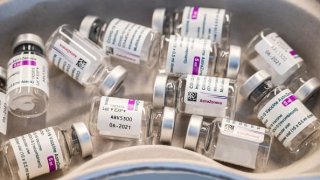
- In January, the European Union placed temporary controls on the export of vaccines made inside the bloc, following a spat with British pharma giant AstraZeneca and wider supply issues.
- The EU has been under pressure for what critics describe as a slow rollout of Covid vaccines.
LONDON — The European Union has made its first intervention into the supply of coronavirus vaccines, with Italy blocking a shipment of the AstraZeneca-Oxford vaccine to Australia on Thursday.
Reuters reported, citing two sources, that British pharma giant AstraZeneca had requested permission from Rome to ship around 250,000 doses from its Anagni, Italy, plant. However, the Italian government refused. The Financial Times also reported the same story and an EU official, who preferred to remain anonymous, later confirmed the move to CNBC.
A spokesperson for AstraZeneca declined to comment when contacted by CNBC. A spokesperson for the Italian Foreign Ministry wasn't immediately available for comment.
Get Southern California news, weather forecasts and entertainment stories to your inbox. Sign up for NBC LA newsletters.
In January, the European Union placed temporary controls on the export of vaccines made inside the bloc, following a spat with AstraZeneca and wider supply issues. The EU has been under pressure for what critics describe as a slow rollout of Covid vaccines.
The European Commission, the institution leading the purchase agreements, has been blamed for not securing enough vaccines, and the region's medical agency has been criticized for taking too long to approve inoculations that have received the green light elsewhere.
The controls will last until the end of March and give powers to EU member states to reject authorizing exports if the vaccine makers do not honor contracts.
Money Report
In January, AstraZeneca said it would be delivering far fewer doses to the EU in the spring than initially expected, due to production issues at its plants in the Netherlands and Belgium. On Jan. 31, it then said it would deliver 9 million additional doses in the first quarter to try to make up for the shortfall.






